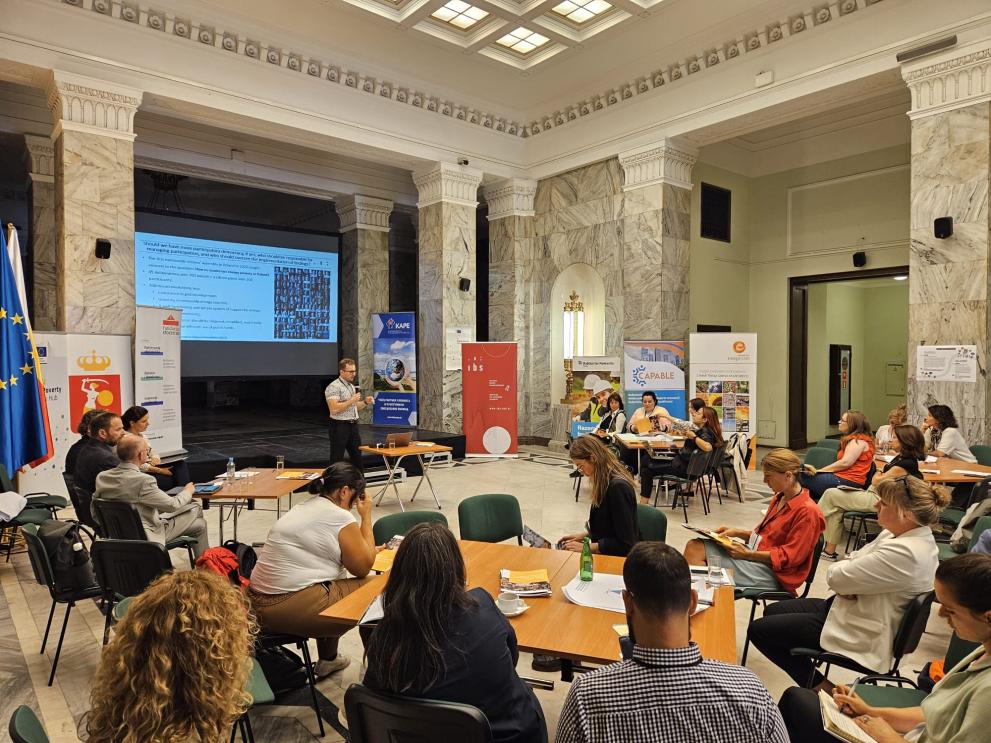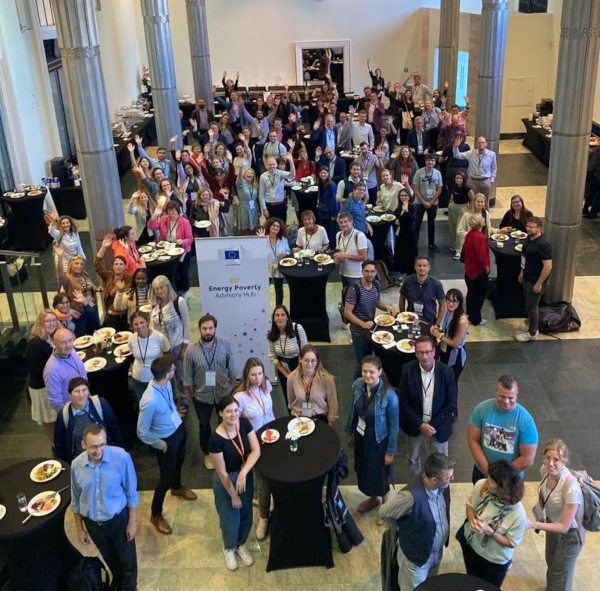
“We put energy poverty at the center of our policy because we want to include everyone, we do not want to make the rift bigger between different inhabitants of our city” mentioned Rafał Trzaskowski, Mayor of Warsaw at the kick of the Energy Poverty Advisory Hub (EPAH) annual conference that took place on 19-20 September in the vibrant city.
With more than 170 participants on-site and 160 online from 23 countries, the two-day event was a unique opportunity for local governments, EU institutions, energy agencies, civil society organisations and all stakeholders active in energy poverty transition to gather and exchange about the emergency coping mechanisms to sustainable policies and measures to reduce energy poverty.
The Mayor kicked off the event with a fervent declaration of Warsaw's commitment to inclusivity and narrowing the divide among its citizens. He presented valuable examples of the city’s actions to tackle energy poverty and particularly focused on the complexity of the challenge as well as the multiple benefits for citizens when energy poverty is mitigated. He highlighted that “by following the green agenda, cities can also realise other priorities” such as alleviate poverty and help students perform better at school due to the improved levels of comfort at home.

At the same time, Tadhg O'Briain, Deputy Head of Unit, Unit B1 Consumers, Local Initiatives, Just Transition of the European Commission focused on the need for a multi-level approach. “The need to be able to deliver to the ground has never been taken more seriously. Energy poverty needs to be addressed within the European, national, and regional levels and the Energy Poverty Advisory Hub helps to deliver this needed support to municipalities and local governments”, he mentioned at his welcoming remarks.
Giorgos Koukoufikis, Project Leader – Just and Empowering Transitions, Joint Research Centre, European Commission from his side focused on the legal EU energy poverty policy landscape. “Access to safe, clean and renewable energy is important for human development. Hereby empowerment means not only access to energy but also ownership.” He added during his speech that “we need to transition from tapping emerging coping mechanisms to stable measures”.
Following the official opening remarks, the conference took off to a vibrant event with two panels and nine workshops. Participants were called to exchange, learn and share from good practices focused on the themes of collaborative approaches, upskilling and reskilling, diagnosis, financing renovations, energy communities, one-stop-shops, transport, energy equity and the Social Climate Fund.
The grand finale of the conference saw participants embarking on a site visit to the Old Praga district, a recent testament to rapid redevelopment in Warsaw. Guided by experts from the Praga Museum of Warsaw, attendees were immersed in the multifaceted aspects of this urban revival initiative. Key highlights included the renovation of historic tenement houses and their integration into the district heating network, a noteworthy step in addressing the urban heat island challenge.
This high-level event was organised by the Energy Poverty Advisory Hub in collaboration with the City of Warsaw and with the support of the European Committee of the Regions and the Association of Municipalities Polish Network "Energie Cités" (PNEC).
Below you can find the recording of the first day as well as the presentations used during the event:
EPAH Conference - Live stream
19 September 2023
Panel discussion "Unlocking potential: New approaches to skills for energy poverty eradication"
‣ Marta Saiz, Architect, Empresa Municipal del Suelo Y la Vivienda de Getafe, Spain
Collaborative approaches: How to form effective partnerships for energy poverty
‣ Julien Denis, la Maison de l'Habitat Grand Chambord Beauce Val de Loire, France
‣ Halina Jagielska, European Youth Energy Network
‣ Aleksandar Macura, Co-founder, Programme Director, RES Foundation
‣ Anamari Majdandžić, Senior Expert, DOOR
From diagnosis to planning: Harnessing the effective use of indicators
‣ Balint Menyhert, Research Economist, Joint Research Centre, European Commission
‣ Paola Valbonesi, Full Professor of Economics, Head of the Department of Economics and Management “Marco Fanno”, University of Padova
‣ Pedro Palma, Researcher, NOVA School of Science and Technology - FCT NOVA, Energy Poverty Advisory Hub
‣ Alice Corovessi, Managing Director, INZEB
‣ Joao Pedro Gouveia, Principal Researcher, NOVA School of Science and Technology - FCT NOVA, Energy Poverty Advisory Hub (moderator)
20 September 2023
Financing renovations where it is most needed: Investment plans for renovations
‣ Jan Nill, CLIMA B1, Policy coordinator ETS for buildings, road transport and additional sectors, European Commission
‣ Jakub Sokolowski, Economist, Institute for Structural Research (IBS)
‣ Jan Frankowski, Energy Analyst, Institute for Structural Research (IBS)
The role of energy communities: Structural obstacles and benefits for vulnerable consumers
‣ Giorgos Koukoufikis, Project Leader – Just and Empowering Transitions, Joint Research Centre, European Commission
‣ Jurijs Grizans, Officer in Sustainable Energy Planning and Carbon Reporting, ICLEI – Local Governments for Sustainability
‣ Miguel Macias Sequeira, PhD Candidate at CENSE FCT-NOVA, on the Telheiras Renewable Energy Community, Lumiar Civil Parish
‣ Alejandro López Parejo, Project Coordinator, Getafe City Council
‣ Marta Garcia, CEO, Ecoserveis, Energy Poverty Advisory Hub
One-Stop-Shops to empower citizens: Involving communities to help alleviate energy poverty
‣ Liljana Alceva, Deputy Director, Habitat for Humanity Macedonia
‣ Lorena Sánchez Relano, Research Engineer, IERC and Ivanka Pandelieva-Dimova, Project Manager, Sofia Energy Centre (SEC)
‣ Gyorgy Sumeghy, Associate Director, Policy and Advocacy, Europe and the Middle East, Habitat for Humanity International (moderator)
Policies and measures to tackle transport and energy poverty: Country views and action-oriented guidance
‣ Common PPT for all speakers of the session
From Social Climate Fund to Social Climate Justice: Uniting ambitious climate and social policy goals
‣ Jakub Sokołowski, Economist, Institute for Structural Research (IBS)
Empowering energy equity: Strategies for reaching and engaging vulnerable consumers and stakeholders
Common PPT of the following speakers
‣ Dr. Dewi Vliexs, EU Project Officer, South East Energy Agency
‣ Miljenka Kuhar, Senor Expert, DOOR
‣ Izabela Kuśnierz, Project Manager, the Association of Municipalities Polish Network "Energie Cités" (PNEC)
‣ Colin Healy, Communications Officer, South East Energy Agency, Ireland (moderator)
Details
- Publication date
- 23 September 2023
